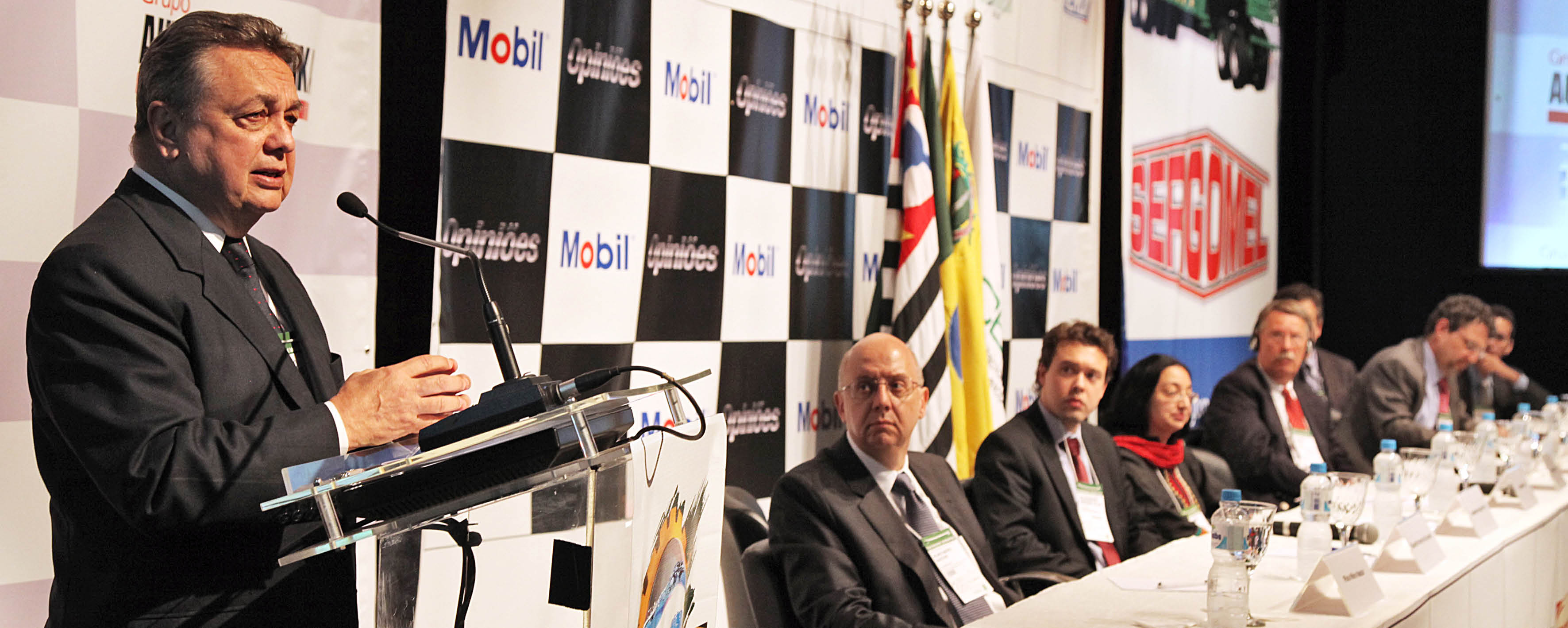Dietrich Klein
CEO of the German Bioethanol Industry Association
Op-AA-30
International vision - Visão internacional
Although I have so often heard the word “crisis” here in Brazil, I believe you Brazilians have all the reasons in the world to be optimistic. It is certain that success will not come automatically, you have to work, fight for it, invest in it, but Brazilian agriculture has such huge potential, that all it takes is to follow the path you have chosen so many years ago, for everything to work out well.
Yes, of course there is competition, but I didn’t make this trip from Berlin to Sertãozinho to be an opponent. I came to learn, to receive and provide information so that we may work together as partners. I know your work and I know there is much to learn, on both sides. For instance, I know the work of UNICA and I can say that they are working very efficiently in Brussels, at times even too efficiently in light of our interests and I wish to congratulate you on this.
I wish to speak about the ethanol industry, or bioethanol as we call it, in Germany. There are three key expressions associated with bioethanol in Germany and the European Union (UE): energy savings, energy from renewable sources and the sustainability of fuels for transportation. There are other important facts to consider that we should comment on, such as: change in land use, greenhouse gas emissions and the bioethanol market.
In Brazil, the ethanol industry may be exclusively called the sugarcane industry. Not so in Germany, because ethanol is made of many products, such as beet, corn, cereal and grains in general. For German industry, bioethanol is a coproduct, because for one million tons of bioethanol we use two million tons of byproducts, such as animal feed, fertilizer, food, CO2, and many other inputs. This situation greatly enhances competition and the development of technology.
We are leaders in biofuels efficiency. It is interesting to see what can be done to improve the situation. The first expression is energy savings.
The European Union has made a mandatory decision, i.e., to replace sources of energy with renewable ones by 2020, to the extent of 20% of the community’s total final energy consumption and 10% for fuels used in all means of transportation. Germany went even further.
The federal government has set as a target for Germany, to replace 30% of energy used for electricity, heating and fuel, by renewable sources: 30% by 2030, 45% by 2040 and 60% by 2050. We can therefore well imagine what kind of fuels will be used by the children of our children in 2050. I should also point out that for mankind 2050 is tomorrow.
Taking into consideration the development predicted for energy consumption between 2005 and 2020 and the mandatory reductions, we come up with actual reduction estimates of 40% of fossil energy. This does not only affect the transportation fuel market, but all sectors. Should we close down refineries? What will happen in the chemical industry? What industries dependent on oil will be able to continue to operate? We lack those answers.
In the EU we have legislation that is very clearly defined, with well established criteria concerning what is necessary to qualify a product as sustainable or not. I know that the Brazilian government and even UNICA take part in the discussions in Brussels and the approach taken has been entirely accepted. What was deemed not acceptable are biofuels produced on land with a high value for bio-diversity, such as protected and native forest areas, for example, where there are high greenhouse gas emissions, or when originated in countries not signatories of the treaty, or such that bring about indirect change to the use of land – and at this point I wish to give an explanation.
There exists a report by a commission, which is still pending, which looks into political options, a global factor to be applied to biofuels, considering where they are produced and the link between the production of biofuels and deforestation.
I wish to emphasize the fact that growth of ethanol production in Brazil is inversely proportional to the deforestation curve in Amazonia, i.e., in 2003, deforestation of Amazonia amounted to 27,000 km2, whereas ethanol production was at 14.8 million m3. In 2010, deforestation of Amazonia was at 6,500 km2, whereas ethanol production reached 35 million m3.
This data proves that ethanol production is increasing and that deforestation in Amazonia is decreasing. It this an adverse effect? Does ethanol production cause deforestation? Or is it that ethanol production is preventing this from happening? None of these two possibilities. I believe the crucial aspect is that several successful activities in Brazil protect the Amazon forest and therefore I say that this theory or this hypothesis about indirect change of the use of land has no basis. We do not accept this because this is the last battle stance of some NGOs that are against biofuels in general.
With respect to greenhouse gas (GHG) emissions as related to the European Union, the directive actions to be undertaken between 2009 and 2030 for fuel quality set the mandatory target that fuel suppliers must reduce lifecycle GHG emissions per unit of energy from fuel and energy supplied, by 6% by 2020. In Germany the Federal Emission Control Act has defined 3% as the target by 2015, 4,5% by 2017 and 7% by 2020.
The European Union additionally sets as recommended targets, 2% by the supply of energy for transport and any technology (including carbon capture and storage) and 2% by GHG emissions credit.
Renewable energy must be sustainable and certified as such, whereas this verification system was accepted by the EU, and one must also reduce GHG emissions as much as possible. Why is that? Because the most important aspect for the fuel and oil industry is the issue of how much it costs to avoid 1 ton of CO2. This is the most critical issue. The price of one liter loses a bit of its importance, while the bigger reference becomes the cost of avoiding 1 ton of CO2.
With respect to the size of the fuel market in Europe, one foresees that by 2020, about 344 million metric tons of diesel, 45 million of biodiesel, 67 million of gasoline and 13 million of bioethanol will be consumed. As related only to Germany, one projects that our consumption will be 29 million metric tons of diesel, 4 million of biodiesel, 12 million of gasoline and 2.3 million of bioethanol.
With respect to the ethanol market, we have two dif-ferent aspects to assess: quality and quantity. We will not look at the numbers here, but rather at the essence of the fact, i.e., what is the cost of GHG emissions? This brings us to the topic competition. Many people say ethanol should compete with gasoline. I don’t think so. We must win this competition.
With respect to electricity, we must take this matter seriously, because we may also compete with biogas and we have good chances. It is important that the State set the right conditions to reduce fossil fuel consumption and then our objective, our work, will be to compete with different opportunities, different products and with actual innovations.





